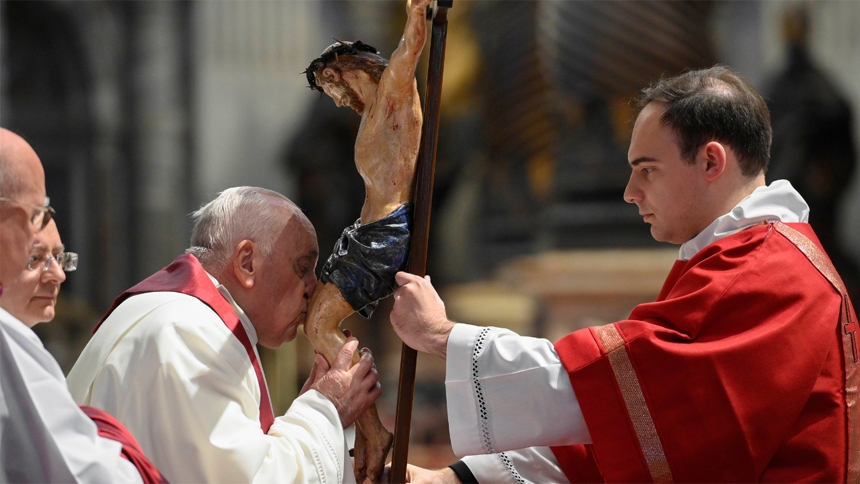
The week that forever changed the world—that's what Christians often call the week leading up to the passion, death and resurrection of Jesus.
But what exactly happens during this week?
There are numerous traditions and celebrations dating back to the early Christians in the first centuries.
The week begins with Palm Sunday where branches are blessed and distributed throughout the church. This marks the beginning of Jesus' journey to the cross.
God is at our side in every affliction, in every fear; no evil, no sin will ever have the final word. God triumphs, but the palm of victory passes through the wood of the cross. For the palm and the cross are inseparable.
The next big celebration is the Chrism Mass on what is known as Holy Thursday. During this celebration, a bishop blesses three oils. They are important for the role they serve throughout the year in the Church.
"The name comes from the most important oil, chrism, which is an oil mixed with perfume. The other two are the oil of the catechumens and the oil for the anointing of the sick," said Giovanni Zaccaria, Liturgy Expert, Pontifical University of the Holy Cross. "Chrism oil is also used when we consecrate a new church, which is blessed at 12 points as a sign of the 12 apostles. The altar is also anointed with this fragrant oil and the hands of priests and the bishop's head are anointed on the day of their ordinations."
On the same day in the evening, 12 people are chosen from the parish or local community to have their feet washed. And in Rome, Pope Francis has often traveled to a prison to carry out this tradition.
Holy Thursday means the start of the three days leading up to Easter. And the Mass on that day ends without a final blessing.
"The Easter Triduum is as if it were a single celebration stretched out over several days," Father Zaccaria said. "This celebration begins on Holy Thursday and is interesting because the celebration of the Lord's Supper does not end with a blessing. It continues with Eucharistic adoration during the night. Then, the next day, the cross is adored, the Passion is read, and only on Saturday night does this great celebration conclude with the proclamation of the resurrection."
On the Friday of Holy Week, people gather together at 3 p.m. to read through the Passion of Jesus. But this is the one day a year no Mass offered in any Catholic Chruch.
"It is a tradition that really comes from the first centuries. Maybe one reason could be that precisely because with this celebration, we are reliving the events of the Passion and death of Jesus," Father Zaccaria said. "We don't have Mass but a celebration where we read the Passion; we adore the cross; and we receive the communion that was consecrated the day before."
The celebration that concludes this triduum is the Easter Vigil, which is usually celebrated on the night of Holy Saturday. This celebration begins in darkness. The lights of churches around the world are suddenly turned on at the moment the resurrection is announced. This is also when adults who have decided to enter the Catholic Church are baptized.
On Sunday, Christians celebrate Easter, and the week ends with a special blessing from the pope called the Urbi et Orbi that typically only happens twice a year. It is a blessing for Rome and for the whole world and includes a plenary indulgence.
"The Urbi et Orbi is a blessing given to the city, Urbi, and to the world, Orbi, on special days, on days that have a particularly important liturgical significance," Father Zaccaria said. "The idea is precisely that the pope from Rome imparts a blessing to the city and to the whole world, following the mystery that is being celebrated."
With this blessing, Christians begin the Easter season that lasts 50 days—10 days longer than the season of fasting and penance in Lent.

